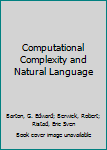Computational Complexity and Natural Language
Select Format
Select Condition 
Book Overview
Computational Complexity and Natural Language heralds an entirely new way of looking at grammatical systems. It applies the recently developed computer science tool of complexity theory to the study of natural language. A unified and coherent account emerges of how complexity theory can probe the information-processing structure of grammars, discovering why a grammar is easy or difficult to process and suggesting where to look for additional grammatical constraints. For the linguist or cognitive scientist, the book presents a nontechnical introduction to complexity theory and discusses its strengths, its weaknesses, and how it can be used to study grammars. For the computer scientist, it offers a more sophisticated and efficient computational analysis of linguistic theories. Given the variety of new techniques rising from complexity theory, the authors foresee a developing cooperation among linguists, cognitive scientists, and computer scientists toward understanding the nature of human language. The book also describes a set of case studies that use complexity theory to analyze grammatical problems. And it examines several grammatical systems currently of interest to computational linguists -- including spelling-change/dictionary lookup and morphological analysis, agreement processes in natural language, and lexical-functional grammar -- demonstrating how complexity analysis can illuminate and improve each one. All of the authors are at the MIT Artificial Intelligence Laboratory.
Format:Hardcover
Language:English
ISBN:0262022664
ISBN13:9780262022668
Release Date:March 1987
Publisher:MIT Press (MA)
Length:335 Pages
Weight:1.67 lbs.
Customer Reviews
0 rating





